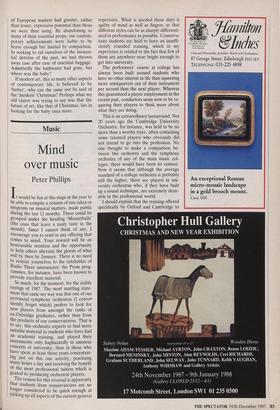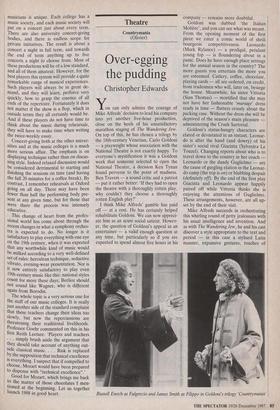Music
Mind over music
Peter Phillips
It would be fun at this stage in the year to be able to compile a column of mis-takes or misprints on musical matters, made public during the last 12 months. These could be grouped under the heading Nozartballs' (the ones that leave a nasty taste in the mouth). Since I cannot think of any, I encourage you to send in any offering that comes to mind. Your reward will be an honourable mention and the opportunity to help others alleviate the gloom of what will by then be January. There is no need to restrict yourselves to the infelicities of Radio Three announcers: the Prom prog- rammes, for instance, have been known to provide excellent material.
So much, for the moment, for the risible sayings of 1987. The most startling state- ment that came my way was that one of our provincial symphony orchestras (I convex niently forget which) prefers to look for new players from amongst the ranks of ex-Oxbridge graduates, rather than from the products of our conservatoires. That is to say, this orchestra expects to find more suitable material in students who have had an academic training, and played their instruments only haphazardly in amateur concerts at university, than in those who have. spent at least three years concentrat- ing just on this one activity, practising many hours a day and receiving the benefit of the most professional tuition which is geared to producing orchestral players. The reason for this reversal is apparently that students from conservatoires are no longer considered to be quick enough at picking up all aspects of the current general repertoire. What is needed these days is agility of mind as well as fingers, so that different styles can be as sharply differenti- ated in performance as possible. Conserva- toire students are held to have an insuffi- ciently rounded training, which in my experience is related to the fact that few of them are anywhere near bright enough to get into university.
The performers' course at college has always been built around students who have no other interest in life than squeezing more semiquavers out of their instrument per second than the next player. Whereas this guaranteed a player employment in the recent past, conductors seem now to be re- quiring their players to think more about what they are doing.
This is an extraordinary turnaround. Not 20 years ago the Cambridge University Orchestra, for instance, was held to be no more than a worthy tryer, often containing some talented players who obviously did not intend to go into the profession. No one thought to make a comparison be- tween this orchestra and the symphony orchestra of any of the main music col- leges: there would have been no contest. Now it seems that although the average standard of a college orchestra is probably still the higher, there are players in uni- versity orchestras who, if they have built up a sound technique, are extremely desir- able in the professional world.
I should explain that the training offered specifically by Oxford and Cambridge to musicians is unique. Each college has a music society, and each music society will put on a concert just about every term. There are also university concert-giving bodies, and there is endless scope for private initiatives. The result is about a concert a night in full term, and towards the end of term anything up to five concerts a night to choose from. Most of these productions will be of a low standard, and all of them amateur. However, for the best players this system will provide a quite remarkable range of musical experiences. Such players will always be in great de- mand, and they will learn, perforce very quickly, how to grasp the essence of all ends of the repertoire. Fortunately it does not matter if the show is a flop, which in outside terms they all certainly would be. And if these players do not have time to think about the music during rehearsals, they will have to make time when writing the twice-weekly essay. Concert-giving both at the other univer- sities and at the music colleges is a much more serious affair. The emphasis is on displaying technique rather than on discus- sing style. Indeed relaxed discussion would be considered detrimental to starting and finishing the sessions on time (and having the full 20 minutes for a coffee break). By contrast, I remember rehearsals at Oxford going on all day. There may have been fewer than half the performing body pre- sent at any given time, but for those that were there the process was intensely educative.
This change of heart from the profes- sional world has come about through the recent changes in what a symphony orches- tra is expected to do. No longer is it satisfactory to play everything with one eye on the 19th century, when it was expected that any worthwhile kind of music would be milked according to a very well-defined set of rules: herculean technique, seductive vibrato, evening-wear presentation. Nor is it now entirely satisfactory to play even 19th-century music like this: national styles count for more these days; Berlioz should not sound like Wagner, who is different again from Borodin.
The whole topic is a very serious one for the staff of our music colleges. It is really just another side of the standard complaint that these teachers change their ideas too slowly, but now the repercussions are threatening their traditional livelihoods. Professor Goehr commented on this in his first Reith Lecture: 'Players and teachers . . . simply brush aside the argument that they should take account of anything out- side classical music. . . . Risk is replaced by the supposition that technical excellence is everything. I suspect that if compelled to choose, Mozart would have been prepared to dispense with "technical excellence".'
Good for Mozart, which brings me back to the matter of those chocolates I men- tioned at the beginning. Let us together launch 1988 in good heart.











































































































 Previous page
Previous page